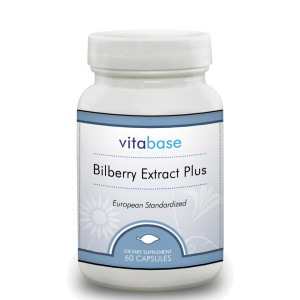Subtotal: $15.15
Eye Health
Bilberry Extract – An Important Antioxidant for the Eyes
|
As with most herbal supplements, the popularity of Bilberry goes back many hundreds of years, with recorded usages for medicinal purposes dating from the early 16th century. Traditionally, Bilberry (Vaccinium Myrtillus) was used as a treatment for diarrhea and dysentery with its astringent qualities being observed to reduce the inflammation associated with these and other conditions such as mouth ulcers, sore throats, hemorrhoids, and varicose veins. However, the advent of World War II heralded a re-emergence in the popularity of the herb when it was noted by British fighter pilots that the inclusion of bilberry in their diets resulted in improved night vision. Subsequent research has isolated a pigment, called anthocyanoside, which enhances microcirculation throughout the body. This phenomenon is particularly noticeable in the delicate blood vessels supplying the retina of the eye. As a result, bilberry plays an important role in improving and maintaining eye health, especially in the elderly. Increased supplementation for this group results not only in enhanced night vision, but a reduction in cataract formation and a slowing of the development of macular degeneration, which is an age-related condition where the light-sensitive receptors in the eye break down. Bilberry also assists in the strengthening of connective tissue and the formation of new capillaries. The anthocyanosides present in bilberry assist in protecting the body from damage by free radicals and as such can be useful in conditions such as arthritis. In addition, the active ingredient in bilberries has been found to lower the incidence of clumping of blood platelets, thus reducing the risk of clot formation and, subsequently, heart attacks and strokes. To date, studies with rats indicate that bilberry extract is a proven preventative of stomach ulcers. Present studies also suggest that bilberry may be effective in controlling blood sugar levels in people with type 2 (adult onset) diabetes. There are no known side effects or interactions associated with bilberry supplementation; however persons taking blood-thinning medications such as warfarin should consult their health care practitioner prior to commencing use. Sale! Antioxidants
$15.15
|


 Bilberry Extract Plus (Formula)
Bilberry Extract Plus (Formula)